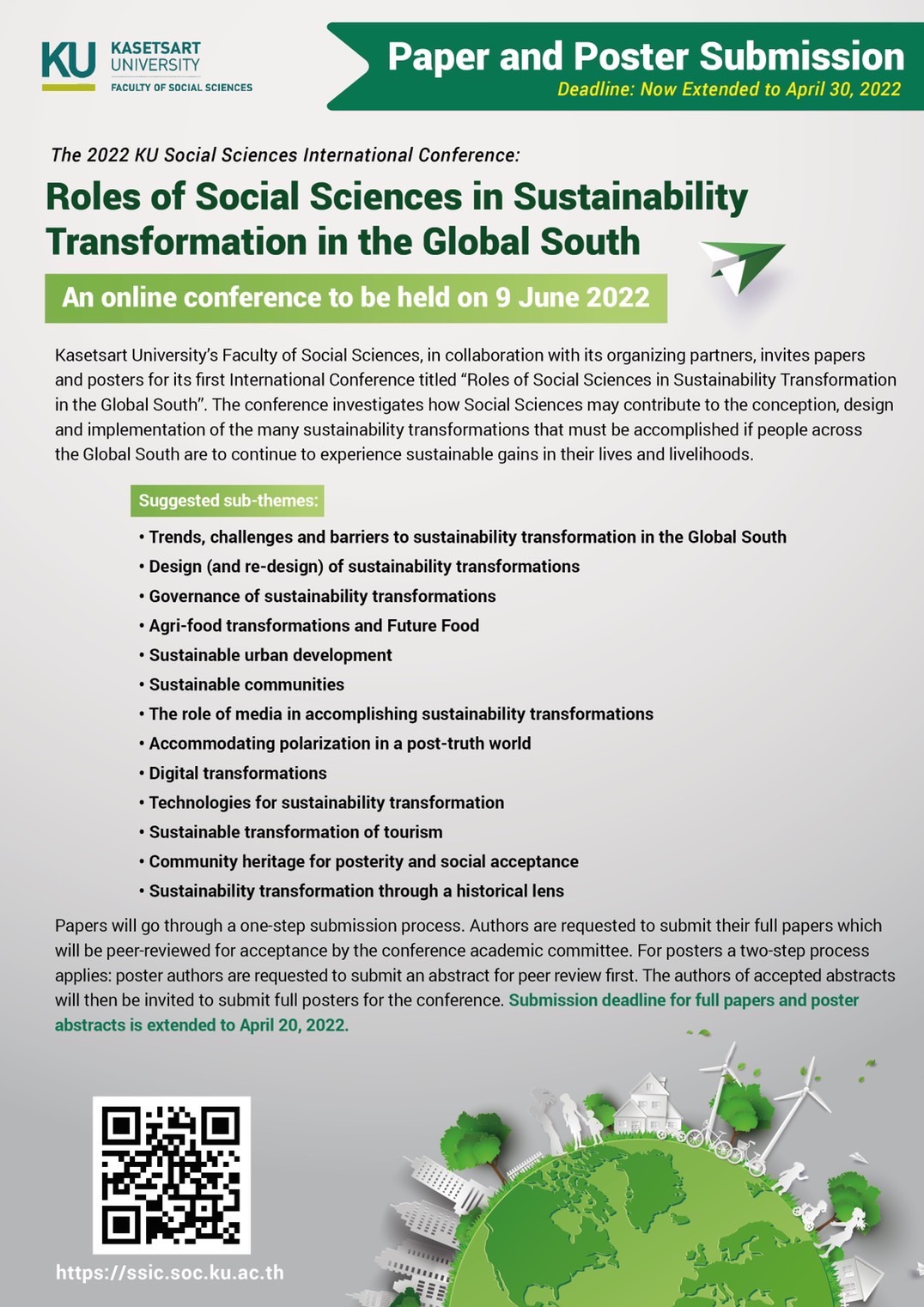毫无疑问,如果世界要在未来几十年实现其可持续发展目标,就必须对造成环境恶化、推动气候变化和加剧不平等的各种社会体系进行重大变革。同样毫无疑问的是,在我们开采、生产、消费、分享、管理和学习的方式上实现必要的转变,对富裕社会和贫穷社会来说都是前所未有的挑战。尽管我们的最终目标日益清晰,但关于实现这些目标的最佳途径,仍然存在着重要的问题。我们的选择多种多样,从在地方层面转变社会生态和社会经济实践,用可持续技术取代不可持续技术,到改变全球盛行的、让我们专注于财富积累而不愿分享的经济和政治范式。但哪些策略可能是最有效和最可行的?如何才能最好地触发和治理实践、社会技术体系和范式的转变?我们可以借助传统的政策工具来实现这些转变,还是需要更具革命性的手段?我们能否依靠政府来帮助我们度过难关,还是我们首先需要建立更广泛的转型推动者和管理者联盟?
诸如此类的问题在全球南方国家尤为突出。与全球北方国家相比,南方国家更容易受到环境恶化和气候变化的不利影响,成功实现可持续发展转型的条件也更不理想。疫情和不断蔓延的气候危机无情地暴露出这样一个事实:尽管全球南方国家近期在经济发展、医疗保健和其他领域取得了诸多进展,但许多地区的状况仍然极其脆弱,容易受到冲击。由于世界富裕国家优先考虑自身利益,各国政府难以应对。
可以说,全球南方对支持可持续性转型的新知识的需求最为迫切。发展这些知识本身就是一项挑战,甚至可能需要变革现有的知识创造和共享实践及体系,这不仅体现在政府层面,也体现在学术界和其他领域。社会科学似乎在其中扮演着重要的角色。这不仅是因为可持续性转型在很多情况下本质上是组织社会应对特定挑战的过程,还因为社会科学或许与其他学科不同,它应该能够在生态、技术、经济和治理之间发挥连接作用。
泰国农业大学社会科学学院的首届国际会议旨在应对转型和知识创造方面的这些艰巨挑战。此次会议由泰国皇家学会办公室、乌汶叻差他尼大学文学院、茂物农业大学人类生态学院、 加纳大学亚洲研究中心以及东部地区公共行政组织联合举办,旨在探讨全球南方国家的社会科学如何为诸多可持续发展转型的构思、设计和实施做出贡献,从而让全球南方国家和人民的生活和生计持续改善。
我们热忱邀请您加入我们的努力,无论您是作为合作伙伴、贡献者还是观众。

| 2022年3月18日 | 提交全文和海报摘要的截止日期 |
| 2022年4月18日 | 向作者公布同行评审结果 |
| 2022年5月1日 | 提交修改论文的截止日期 |
| 2022年5月13日 | 向作者公布修改论文的最终决定 |
| 2022年5月17日 | 口头报告和海报报告的提前注册已截止 |
| 2022年5月20日 | 完整海报提交截止日期 |
| 2022年5月29日 | 口头报告和海报报告常规注册已截止 |
| 2022年6月8日 | 非演讲者报名已截止 |
| 2022年6月9日 | 会议日 |
| 2022年7月29日 | 会议记录可供下载 |
Faculty of Social Sciences, Kasetsart University 50 Ngamwongwan Rd, Chatuchak Bangkok